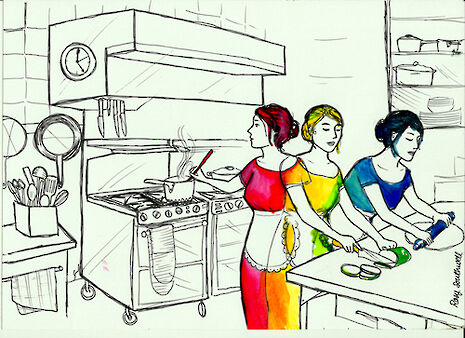Just Who’s Wearing the Apron?
Food and Drink editor Andrew Tindall explores the complex relationship between gender and food

Up and down the kitchens of the country people are chopping, stirring, sautéing and, if television is to be believed, swearing unnecessarily at the slightest opportunity. Day in, day out, there are people preparing meal after meal to sate hungry bellies. Imagine the perspiration on the brow as experienced hands knead dough and toss salads. It is a clear enough image – but who do we imagine beneath the apron?
When I was twelve, I desperately wanted to have cooking lessons. This was cause for amusement in my all-male school. Baking was for girls, metalworking was for boys - women belonged in the kitchen and, should they dare stray, the chain round their ankles should be shortened. A chauvinistic view perhaps, I guess, or at least an attempt to justify those hours wasted in the machine shop, but even after the successes of feminism, the lot of many women around the world is one of a homemaker and cook. The view of ‘women in the kitchen’ is one many of us find hard to shake as its trappings pervade our memories and nostalgias; the idea that food history is imparted from mother to daughter is a comfort comparable to the cuisine. Too often I find myself longing for my Mum’s Beef Stew, the recipe passed down on scraps of paper since time immemorial (although, admittedly, I long equally for stew from my dad’s side of the family. I have a beef stew-centric view of the world that is bordering on requiring an intervention).
Not all kitchens are created equal, even if the sexes are. Over 60% of professional chefs are male – a percentage that significantly increases within fine dining restaurants. Joël Robuchon, French restauranteur and Gault-Millau Chef of the Century (a title undeserved, seeing as Auguste Escoffier died as recently as 1935), possesses an impressive 25 Michelin stars. It would take five Carme Ruscalledas to rival this. It is a sorry state of affairs when the top Google search result for “female chefs” is a list of the “7 Sexiest”, and when Gordon Ramsey, a man who (when he isn’t cussing or philandering) is often considered Britain’s greatest chef famously remarked that women "can't cook to save their lives". Is our view of cooking and gender more complicated than we’d like to admit?
Well, no. At the risk of sounding like a hack sociologist, there is an imposed dichotomy between the ‘domestic’ and the ‘professional’ kitchen even though 90% of the skills used are identical. As a society, we treat labour differently when viewed in these contexts – and not just in food. In my household, as in many, it was my mum who would repair torn shirt seams, yet professional tailors are more often men. The implication made by many in associating women with ‘domestic’ labour is that it is an ultimately unimportant task – food for fuel, not finesse. This ugly view forgets the very reason why food speaks deeply to the soul of society – it is a labour of love and as such is of the utmost importance. The so-called ‘professional’ kitchens, where passion is poured blindly into food to be solicited to those who will pay, are nothing but factories producing calories to be burned. Food should and must be so much more. It is a force that brings people together – by blood, geography or chance – and it does so in the small, cluttered domestic kitchen. Regardless of who is wearing the apron.
 News / CUP announces funding scheme for under-represented academics19 December 2025
News / CUP announces funding scheme for under-represented academics19 December 2025 News / SU reluctantly registers controversial women’s soc18 December 2025
News / SU reluctantly registers controversial women’s soc18 December 2025 News / Cambridge welcomes UK rejoining the Erasmus scheme20 December 2025
News / Cambridge welcomes UK rejoining the Erasmus scheme20 December 2025 Features / Should I stay or should I go? Cambridge students and alumni reflect on how their memories stay with them15 December 2025
Features / Should I stay or should I go? Cambridge students and alumni reflect on how their memories stay with them15 December 2025 Film & TV / Timothée Chalamet and the era-fication of film marketing21 December 2025
Film & TV / Timothée Chalamet and the era-fication of film marketing21 December 2025









